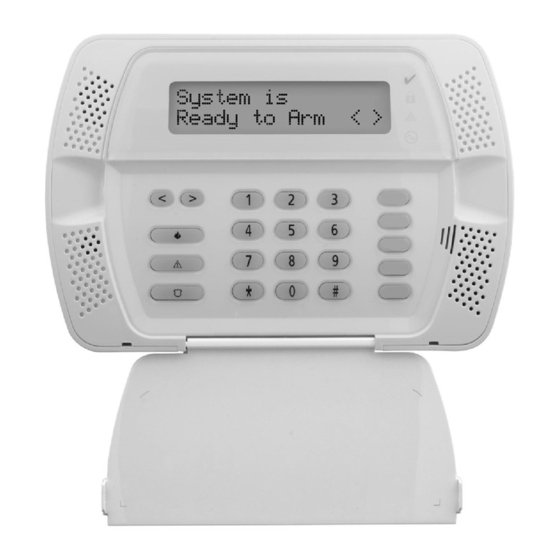DSC SCW9047-868 사용자 설명서 - 페이지 8
{카테고리_이름} DSC SCW9047-868에 대한 사용자 설명서을 온라인으로 검색하거나 PDF를 다운로드하세요. DSC SCW9047-868 20 페이지. Self contained wireless
DSC SCW9047-868에 대해서도 마찬가지입니다: 사용자 설명서 (20 페이지)

Remote Arming and Disarming
The system can be armed and/or disarmed using the remote control device (wireless key). When arming
the system by using the Arm button on the wireless key, the system will acknowledge the command by
sounding a single bell squawk (if bell squawk is enabled) and when disarming using the Disarm button
on the wireless key the system will acknowledge the command by sounding two bell squawks (if bell
squawk is enabled). Three squawk pairs heard when disarming with the disarm button indicates that
that an alarm occurred while the system was armed. If you are unsure of the cause of the alarm, pro-
ceed with caution.
Emergency Keys
F
Press the
(
),
keypad sounder will beep indicating that the alarm input has been accepted and transmission to the
central station is underway. The
setup.
NOTE: The Fire keys can be disabled by the installer.
When Alarm Sounds
The system can generate 2 different alarm sounds:
• Continuous Siren = Intrusion (Burglary Alarm)
• Temporal / Pulsed Siren = Fire Alarm
Intrusion (Burglary) Alarm Continuous Siren
NOTE: If you are unsure of the source of the alarm, proceed with caution! If the alarm was acci-
dental, enter your Access Code to silence the alarm. If the alarm system is disarmed within the pro-
grammed Abort Window (check with the installer if this option has been enabled on your system
and what is the transmitter delay time programmed), no alarm transmission to the Central Station
will occur. Starting at the end of the Abort Window there is a five minute Cancel window, during
which a user can cancel, by entering his access code, an alarm that has been previously transmitted.
A cancel signal will be transmitted to the Central Station and the alarm system will also annunciate
that the cancel signal was transmitted. Call your central station to avoid a dispatch.
Fire Alarm Pulsed Siren
Follow your emergency evacuation plan immediately!
If the fire alarm was accidental (i.e. burned toast, bathroom steam, etc.), enter your Access Code to
silence the alarm. Call your central station to avoid a dispatch.
Time & Date Programming
Press
plus your Master Access Code to enter User Functions. Use the
the menu option then press
date (MM:DD:YY). Press
within the trouble menu (
ble Conditions on page 6),
NOTE: Your installer may have programmed your system to display the time and date while the key-
pad is idle. Press the
Bypassing Zones
Use the zone bypassing feature when you need access to a protected area while the system is armed,
or when a zone is temporarily out of service, but you need to arm the system. Bypassed zones will
not be able to sound an alarm. Bypassing zones reduces the level of security. If you are bypassing a
zone because it is not working, call a service technician immediately so that the problem can be
resolved and your system returned to proper working order. Ensure that no zones are unintentionally
bypassed when arming your system. Zones cannot be bypassed once the system is armed. Bypassed
zones are automatically cancelled each time the system is disarmed and must be bypassed again, if
required, before the next arming.
NOTE: 24-hour zones can only be unbypassed manually.
A
P
(
) or
(
) key for 2 seconds to generate a Fire, Auxiliary or Panic alarm. The
P
(
) key may or may not sound the bell depending on Installer
to select it. Enter the time in 24-hr. format (HH:MM), followed by the
to exit programming. If you are viewing a 'Loss of Clock', trouble from
), press
key to clear the date and time display if desired.
to directly enter Date and Time programming. See Trou-
4
scroll keys to find
